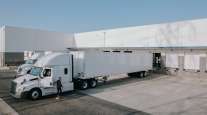Staff Reporter
Uber Freight Announces LTL Expansion

[Stay on top of transportation news: Get TTNews in your inbox.]
Uber Freight has expanded beyond truckload services and is now also offering shippers options for less-than-truckload, the company announced July 15.
“Our vision for the shipper platform is really to become a one-stop shop for all freight,” Michael Bailey, product manager at Uber Freight, told Transport Topics.
“A shipper can come to the shipper platform and move any good at any time and in any way with instant pricing and full transparency,” he continued. “LTL is a key tenet in achieving that strategy, which is why we’re really excited to be here today introducing the LTL shipment solution to the shipper platform.”
Uber Freight is looking to do three main things with the expansion into LTL. The first is bringing the user experience that it crafted for truckload into LTL. The second is ensuring shippers have access to LTL carriers. The third is integrating the LTL option into the shipper platform.
“So we’re providing LTL with the same shipper platform login, the same support team, the same centralized invoicing experience and same notification that our shippers are used to using,” Bailey said. “That is definitely the key thing we’re trying to achieve, to become a one-stop shop for all freight. We think that we can create tremendous value there.”

How do you care for your tires? Host Michael Freeze sets out to answer what factors fleets should consider when investing in TPMS and ATIS. He's joined by Matt Wilson of Hendrickson. Hear a snippet above, and get the full program by going to RoadSigns.TTNews.com.
Uber Freight has been primarily focused on truckload shipments since its founding in 2017. LTL is the natural next step, with the company viewing it as in high demand and ripe for innovation.
“We wanted to focus first on truckloads, which is a market we really transformed,” Olivier Causse, general manager at Uber Freight, said. “We wanted to get truckload to a good spot, which we think we have now, we’re serving a lot of different customers and we have this shipper platform for small- and medium-sized shippers.”
Causse added that from the beginning, feedback from customers included inquiries about LTL. They expressed how they had different needs and sometimes couldn’t fill a full truckload. Uber Freight studied the market and used that feedback to create the LTL option.
“We looked at the best ways to enter LTL and spent a lot of time on it and we’re really excited about the solution we came up with,” Causse said. “We feel like this will answer a key need.”

A partial view of the new LTL option loaded into the Uber Freight app. (Uber Freight)
Uber Freight also wanted to ensure its LTL services reflected the same instant pricing and transparency that truckload has. So with the rollout of LTL the company also introduced several technology solutions available on the platform. For instance, shippers can receive quotes based on item details, delivery locations and dates. The platform also has options to schedule pickups and deliveries, manage LTL billings and track shipments.
“So what we really want to do is take the LTL experience and bring it into the shipper platform and make it similar to our shipper platform experience,” Bailey said. “And the shipper platform experience today, it was really based around having instant pricing and fantastic transparency and that’s what we’re really aiming to do with this.”
Uber Freight sees the new solutions as just a start and has its sights on future innovations. The goal is to tackle obstacles that shippers face in the LTL market and improve that process. A major pain point the company has its sights on is better visibility.
Moving into the LTL market will provide even more opportunities for shippers. Learn more. https://t.co/jDUdpUQQcs — Uber Freight (@UberFreight) July 15, 2021
“The way we enter LTL is in phase one, we really focus on the user experience, user interface,” Causse said. “And that’s in part, because the supplier or the carrier base on the LTL side is very different from truckloads.”
In truckload, there is an enormous amount of carriers and trucking companies. In LTL, a small number of carriers handle the vast majority of the volume, he said.
Want more news? Listen to today's daily briefing below or go here for more info:




